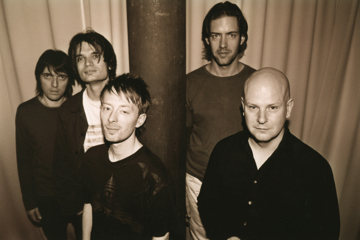Bernard Fanning Taught WAAX How To Swear
Maz DeVita chats to Rosie Piper about WAAX's debut LP, the pressures of being an artist and how change begets growth.

Fans of Brisbane band WAAX’s blistering EPs Holy Sick and Wild & Weak, and indeed anyone who’s attended their famously raucous live shows, might be surprised by the five-piece’s debut LP, Big Grief. It's something vocalist Maz DeVita is acutely aware of.
“I think people are gonna be surprised by it. There’s lots of ebbs and flows to the record and, yeah, hopefully people see us in a different or more mature light.”
She’s referring to the band showing a softer side on the record, with slower tempos and even acoustic guitars making an appearance on tracks such as the builder History, the sweetly calm Changing Face, or the tick-tocking Last Week, whose instrumentation wouldn’t sound out of place on a later-career Radiohead record.
“There’s slower tracks on there. It’s kind of more subdued production on some tracks,” she says. “I think we’ve always been looking for points in the set where we could explore those things and kind of give the set more room to breathe, because then the bigger moments are even bigger when they’re put next to a slower song.”
This new direction was thanks, in part, to the production duo of Grammy award-winning producer Nick DiDia and Brisbane music royalty, Powderfinger frontman, Bernard Fanning.
“Bernard was so understanding and so welcoming and humble. He helped a lot,” DeVita says. “He definitely understood our sound despite the fact that he’d come from a sort of different background. And with Nick DiDia, it was just a really cool combo of musical wizards.”
Don't miss a beat with our FREE daily newsletter
Fanning’s knowledge wasn’t just useful for expanding the band’s sound, however, but also in providing advice to DeVita as a songwriter – like no longer limiting herself with rules like, "Don’t swear in your songs," as evidenced on huge single FU.
“He kind of taught me to stop inhibiting myself,” she says. “I’ve noticed that over the years of songwriting I’ve developed these cans and cannots, like these little OCD things of, ‘Oh, I’m not gonna do that, but oh, I’ll do that.’ He was more like, ‘Well, why? Why do you have that? Why don’t you just open up a little bit and let that be?’”
And the result? “Well, I can’t really find a better word to describe how angry I am, I’m just gonna say, ‘Fuck!'” she says, laughing. “And it worked out. It seemed to fit into the melody. So, I guess I do that now. I guess I’ve changed.”
DeVita sees the shift less as demonstrating growth and more as a process of “unrefining [her]self and becoming less uppity about words”.
The partnership with Fanning has been a fruitful one for the band, and is connected to several career highlights over the past year, including the impending release of their debut LP, a spot in triple j’s Hottest 100 (#88 for banging track Labrador) and a slot on 2018’s Splendour in the Grass line-up, which DeVita remembers very fondly as one of the bigger moments of their career.
“I can’t really relate to something that doesn’t feel authentic to me."
“We got Bernie up to come and sing a Powderfinger song with us,” she says. “We were super nervous to ask him to do it but he was super keen and that was really fun. People were like, ‘Oooh, wow. It’s legit. They’re really working together.’ It’s one of my favourite sets that we’ve ever played.”
Despite all of the upsides though, the record is still called Big Grief, and certainly traverses some darker themes, with an almost prophetic connection to a recent loss for the band.
“We’re grieving the loss of a band member as well,” DeVita reflects. “We’ve recently parted ways with our guitarist, Chris [Antolak], and that was only very recent, so it’s been a very emotional time for us, I suppose, in the last couple of months. I feel like the record was sort of therapeutic for that sort of thing as well.”
The grief associated with loss, says DeVita, is the overarching theme of the record – a theme that has extremely personal ties to her life and personal experience.
“I can’t really relate to something that doesn’t feel authentic to me,” she says.
Loss, in this case, does not necessarily mean death, but looks at people coming in and out of DeVita and the band’s life. It covers, in part, the vulnerability one might feel in such a situation and how it’s ok to feel bad, but also the power that can be taken from these feelings and experiences.
“I think a lot about how what I like to do is definitely this raw vulnerability,” she says. “It’s something that isn’t explored enough, I feel. Just the humanness of being vulnerable – that’s what I relate to the most because we all are in some way, no matter what situation we’re in, we can still feel vulnerable. I touch on those things a lot and I touch on the feelings of gaining power from those situations but also feeling deflated and sometimes quite self-deprecating and how that’s ok.”
This sentiment can be heard on FU, a song whose vicious title might be seen as a furious bark at someone else. DeVita says it’s actually more than that.
“I’ll have hints of songs that sound like they’re directed at people but then I always have a moment within the songwriting where I’m looking at my own feelings and looking at what that person’s done and at the interrelations between myself or someone else. I think though definitely for FU, I really get really annoyed when people try to walk all over me or act like I’m a doormat or they think that because I’m this understanding, nice person that they can kind of use that to their advantage and then think, you know, they don’t know me at all. I’m strong, I have integrity and fuck you for thinking that I can be spoken to in such a way or told to do something that I don’t want to do. So yeah, it’s kind of inward and outward.”
The band is set to take this badass attitude on the road soon, which has always been their number one joy – DeVita explains how they all work “a shitload” to be able to bring their music to their fans.
“People don’t realise how much work goes into it. Not just the music itself but actually supporting yourself as an artist,” she says.
“I don’t like instability. I like knowing what’s happening. I’ve just had to grow into accepting that if this is the choice that I make as a career, then that’s just how it’s got to be and just hope for the best,” she laughs. “For example, me, I work in an office and then I go and play the rock show and it’s quite a dichotomy in life, but that’s just how it is, I guess.”
WAAX is managed by Leigh Treweek, who is a director of Handshake Media, owner of this website.







